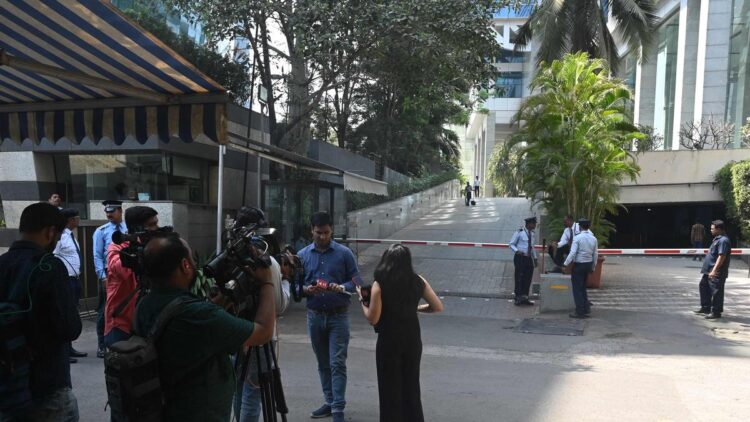[ad_1]

In this file photo, members of the press outside an office complex where the tax authorities raided BBC office in Mumbai.
| Photo Credit: AFP
The U.K. government was questioned by MPs in the House of Commons on its response to the income tax (IT) raids on BBC offices in New Delhi and Mumbai last week. Tory MP, David Rutley, who is the Parliamentary Undersecretary of State for the U.K. Foreign, Commonwealth and Development Office (FCDO), took questions on the raid and freedom of expression in India, from members representing a cross section of opposition parties as well as his own, for just under twenty minutes on Tuesday afternoon. Mr Rutley strongly defended the BBC.
“We stand up for the BBC, we fund the BBC, we think the BBC World Service is vitally important.,” Mr Rutley said , adding that the U.K. government wanted the BBC to have the editorial freedom and noting that the BBC criticizes the Conservative Party and the Labour Party.
“It has that freedom which we believe is vitally important and that freedom is key. We want to be able to communicate the importance of that with our colleagues…our friends across the world, including the government in India,” he said.
“Let’s be very clear: this was a deliberate act of intimidation following the release of an unflattering documentary about the country’s leader ,” said Jim Shannon, of Northern Ireland’s Democratic Unionist Party (DUP), as he kicked off the debate with an ‘Urgent Question’. The BBC’s offices were raided weeks after the channel released a two part documentary, ‘India: The Modi Question’, which was deeply critical of Prime Minister Narendra Modi’s role in the 2002 Gujarat riots and the BJP’s relationship with India’s Muslims.
Also read: Survey at BBC offices revealed multiple irregularities, says I-T Department
“…media freedom and freedom of speech are essential elements for robust democracies,” Mr Rutley said, declining to comment on the specifics of last week’s tax raid. He acknowledged that the issues being faced by NGOs and faith based organisations in India (raised in the question) was an important one.
Conservative MP Julian Lewis characterised the raid as “extremely worrying”.
Labour MP Fabian Hamilton said India was “rightly proud” of its place as the world’s largest democracy , but called the raids “deeply worrying” regardless of the “ official narrative” of why they occurred. He asked what steps were being taken to protect the BBC World Service from intimidation and what discussions Mr Rutley ( the U.K. government) had had with the BBC and with his Indian counterpart on the welfare of BBC staff.
Also read:Income Tax teams ‘survey’ BBC offices over ‘violation’ of laws
“On this side of the house, were particularly worried about reports that suggest the BBC staff had been forced to stay in their offices overnight and have faced lengthy questioning,” he said.
“In any democracy the media must have the ability to criticise and scrutinise political leaders without fear of repercussions, and that clearly applies in this situation,” he added.
Mr Rutley said the U.K. and India had a “broad and deep relationship” and that this particular issue had been raised with the government in the context of the larger set of issues that the U.K. and India discuss. The British government was continuing to monitor the situation, as per Mr Rutley, who said the BBC was supporting its staff and that consular support was also available to them, if requested.
“The SNP [Scottish National Party] absolutely condemn this alarming attack on the BBC offices in New Delhi and Mumbai, “ MP Drew Hendry said. He also raised the (2017) arrest of Scottish man Jagtar Singh Johal in Punjab.
At one point in the debate, Liberal Democrat MP Jamie Stone asked if the British government would consider working with the United States and other democracies to “put pressure” on India and call out “this completely unacceptable behaviour”. Mr Rutley did not answer the question, saying instead that he could not comment on the specifics of the allegations and the investigations.
[ad_2]
















